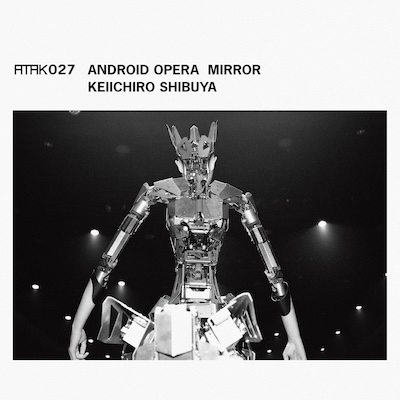
Keiichiro Shibuya, ANDROID OPERA MIRROR
ATAK027, DL/CD, ATAK, February 21 2025
New Single Now, Instagram, Discogs
PREMIERES
Nov 27 I Come From The Moon (Android Opera ver.) single premiere
Jan 15 BORDERLINE single premiere
Feb 21 Midnight Swan (Android Opera ver.) single and full album premiere
RSVP
Feb 20 Tokyo, Rittor Base 7 PM: Keiichiro Shibuya sets off a track-by-track album premiere, Q/A session with ex-Sound & Recording EiC Susumu Kunisaki, plus a short live set
HIT US UP BELOW FOR MORE INFO,
INTERVIEW, PREMIERE, MIX/SHOW,
RADIO PLAY, CONFIRM COVERAGE.

Rooted in the theories Japanese composer, musician, artist and academic Keiishiro Shibuya investigated with his acclaimed android opera stage productions, ‘ANDROID OPERA MIRROR’ is an ambitious, multifaceted sci-fi epic that wonders how an AI-equipped humanoid robot might react to the most human artistic experiences, conducting an orchestra and performing as a solo vocalist. The only human element on the album is Shibuya’s tender piano playing; even the orchestral elements, which were tackled by humans in the stage show, are built from artificially generated data that’s then mixed and processed like a normal orchestral production. It’s Shibuya’s opportunity to present a scenario where human beings and android-like technology are not in opposition to each other, but in harmony.
Set some time in the far future, ‘ANDROID OPERA MIRROR’ weaves together memorable, iconic themes, experimental electronic motifs and bombastic neoclassical flourishes, posing questions that touch on philosophy, religion, literature, art and technology. The concept has been in development since 2017, and Shibuya has already staged variations in Australia, Japan, Germany, the Middle East and Paris, but ‘ANDROID OPERA MIRROR’ isn’t just an archive of these original performances – it’s a fresh examination of the source material that continues to blur the boundary between man and machine.
Shibuya has been recording cutting-edge electronic music since the early 2000s, in ’02 founding the ATAK label and releasing not just his own compositions and collaborations, but work from avant-garde pioneers such as Mika Vainio, Yasunao Tone and Kim Cascone. His outlook shifted considerably in 2008 following the tragic death of his wife (and ATAK co-founder) Maria, when he returned to the piano for the first time in years to compose a touching elegy. And since then, Shibuya has been motivated to amalgamate sound design with classical music, writing operas and film scores, and working with high-profile brands like Gucci, Prada, Nike and Lexus.
His first experiment with non-human vocals came in 2012, when he dug deep into his personal life to compose “THE END”, an existential Vocaloid opera starring Hatsune Miku that went on to sell out shows in Paris, Barcelona, Tblisi, Hamburg, Aarhus and Amsterdam. It proved to be a formative experience, prompting the artist to devise the android opera concept, drawing from both his artistic background and his years working on AI music creation methods at Osaka University of the Arts’ Android and Music Science Laboratory.
‘MIRROR’, the album’s opening track, establishes Shibuya’s narrative, layering hypnotic drones, tense, reverberating rhythms and orchestral sweeps that couch poetic, robotic statements that unlock the concept itself. “What is the boundary between existence and non-existence?,” a disembodied voice asks. “What is the boundary between past and future? And where do they exist? Let’s celebrate this new experience together.” And although on ‘Scary Beauty’, a track Shibuya has been performing since the project’s inception, he excerpts words from French novelist Michel Houellebecq’s controversial ‘The Possibility of the Island’, ‘BORDERLINE’ heads more assuredly towards the digital realm, using lyrics generated by GPT software. “Pain is a vital part of our lives,” sings Shibuya’s android starlet. “The world you have once loved is no longer yours.” It’s a chilling performance that crystallizes Shibuya’s notions on the tenuous relationship between life and death, human and automaton, with the phantasmic words spiraling around touching piano phrases and brassy swells.
Based on a solo piano composition Shibuya wrote for Eiji Uchida’s award-winning 2020 film of the same time, ‘Midnight Swan (Android Opera ver.)’ fleshes out the popular original theme with lush orchestrations and GPT-generated android vocals. The track is the album’s unofficial centerpiece, adding a glittering chamber pop twist to a memorable melody that’s already racked up close to seven million views on YouTube, reaching number one on Apple Music Japan’s Instrumental Songs chart. And Shibuya takes a similar approach on ‘I Come From the Moon (Android Opera ver.)’, spiking a song he penned for Gucci’s ‘Kaguya By Gucci’ campaign with reworked orchestral elements, piano and electronics. Shibuya and his android were featured in the short film itself, and it’s an apt showcase of their union, with the pneumatic, club-ready beats contrasted by the android’s sugar-sweet, heartbreaking vocals.
On ‘Lust’, meanwhile, a piece written for a 2023 performance at Paris’s Théâtre du Châtelet, the album’s themes harmonize when Shibuya introduces the esoteric Buddhist teachings of the Rishu-kyo. Shibuya has collaborated with the monks plenty of times over the years, and uses their philosophy of interconnectedness as a lens to survey desire and life’s relentless forward motion. A monumental track, it encapsulates the album’s unique fusion of classical knowledge and speculative science fiction, balancing its dramatic android vocals on a colorful platform of rubbery electro-acoustic instrumentation.
Composition, Piano, Electronics: Keiichiro Shibuya
Text: Keiichiro Shibuya (1) , GPT (3,4,6,7,8)
Excerpts from “The possiblity of the island” written by Michel Houellebecq (2, 9)
Excerpts from “On Certainty” written by Ludwig Wittgenstein (4)
Android Vocal Production: Keiichiro Shibuya, Shintaro Imai
Text-to-Note Programming: Takashi Ikegami (4)
Mix, Piano Recording: François Baurin (Hinterland Lab)
Mastering: Rashad Becker (Clunk)
Score Notation Assistant: Hiroto Kikukawa
Artwork: Ryoji Tanaka
Photograph: Ayaka Endo
Production: Natsumi Matsumoto (ATAK)
Produce: Keiichiro Shibuya (ATAK)
ATAK027 – All rights reserved
(P)+(C) 2025 ATAK, CULEN (6)
The musical contents may not be published, broadcast, or redistributed in whole or part without express written permission
